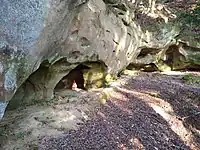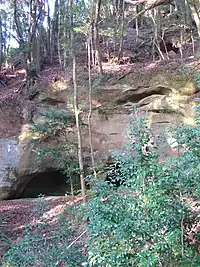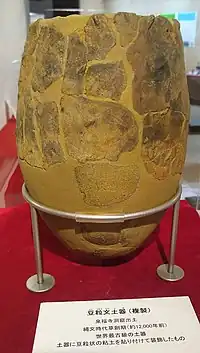
Senpukuji Cave from the entrance

Senpukuji Cave

Pottery found from Senpukuji cave dating about 12000 years ago
Senpukuji Cave is a significant paleolithic site located in Sasebo, Japan from the early incipient Jōmon period.[1] The site was anciently used seasonally to make microlithic tools. 2,153 tools have been found in one layer.[2] Pottery has been found that was created using a linear applique technique.[3] The antiquity of these ceramics dates to the final pleistocene.[4] It has been dated by Carbon-14 to be about 12000 years old.[1]
See also
References
- 1 2 Ryuzaburo TAKAHASHI, Takeji TOIZUMI and Yasushi KOJO "Archaeological Studies of Japan: Current Studies of the Jomon Archaeology", page 51, 62
- ↑ E.A. Solovyeva and Y. Murakami, "Archaeology, Ethnology and Anthropology of Eurasia" 48/3 (2020) 43–49
- ↑ Imamura, K. (2016). Prehistoric Japan: New Perspectives On Insular East Asia. United Kingdom: Taylor & Francis. Page 51
- ↑ Hiroshi Kajiwara and Aleksei V. Kononenko, "THE ORIGIN OF EARLY POTTERY IN NORTHEAST ASIA IN THE CONTEXT OF ENVIRONMENTAL CHANGE" page 64
This article is issued from Wikipedia. The text is licensed under Creative Commons - Attribution - Sharealike. Additional terms may apply for the media files.